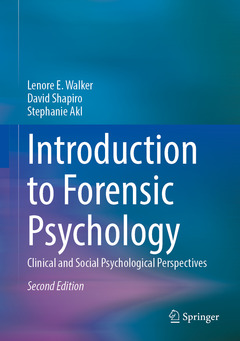Description
Introduction to Forensic Psychology (2nd Ed., 2nd ed. 2020)
Clinical and Social Psychological Perspectives
Authors: Walker Lenore E., Shapiro David, Akl Stephanie
Language: English
Subjects for Introduction to Forensic Psychology:
Keywords
Delinquency; Involuntary Commitment; Juvenile Justice; Therapeutic Jurisprudence; civil law; clinical psychology perspectives; criminal responsibility; expert testimony; family law; forensic psychology; legal rights of children; malpractice; personal injury; psychological interventions in forensic settings; reproductive rights and the law; school violence; self-defense and syndrome testimony; social psychology perspectives; trial consultation
158.24 €
In Print (Delivery period: 15 days).
Add to cart393 p. · 17.8x25.4 cm · Hardback
Description
/li>Contents
/li>Biography
/li>Comment
/li>
This book provides a broad overview of the history and practice of forensic psychology, illustrating the principles of how psychological knowledge can inform judges and juries in the U.S. legal system with reference to several high publicity cases. The second edition contains new case law and discusses its implications in the major areas of forensics, examining new developments in juvenile justice, malpractice complaints, and reproductive rights, among other topics.
The authors address specific aspects of forensic psychology within seven distinct sections:
- What is Forensic Psychology?
- Understanding the Criminal Mind
- Can Psychologists Measure Pain and Suffering?
- Family Law and Fitness to Parent
- Juvenile Justice
- Legal Consultation Based on Social Psychology
- Practical Tips for Forensic Psychology Experts
An essential resource for current and aspiring forensic psychologists, the second edition of Introduction to Forensic Psychology serves as a thorough introduction to a complex field, featuring updated cases and related legal developments.
Part I What is Forensic Psychology.- Introduction to Forensic Psychology.- Models of Legal Systems.- Admissibility of Expert Testimony.- Part II Understanding the Criminal Mind.- Criminal Responsibility.- Competency to Stand Trial.- Self-Defense and Syndrome Testimony.- Clinical Assessment in Forensic Settings.- Psychological Interventions in Forensic Settings.- Therapeutic Jurisprudence and Best Practices.- Part III Can Psychologists Measure Pain and Suffering?.- Civil Law and Personal Injury.- Involuntary Commitment and Other Civil Liberties.- Malpractice.- Part IV Family Law and Fitness to Parent.- Marriage and Divorce.- Access to and Protection of Children (in family law).- Reproductive Rights and the Law.- Part V Juvenile Justice.- Delinquency.- School & Workplace Violence.- Legal Rights of Children.- Part VI Social Psychology and Legal Consultation.- Discrimination and Sexual Harassment.- Eyewitness Identification.- Jury Selection and Trial Consultation.- Part VII Practical Tips for Forensic Psychology Experts.- Forensic Experts and Attorneys: Communication Process.- Risk Management in Forensic Psychology Practice.
Dr. Lenore Walker and Dr. David Shapiro are two of the pioneers in the field of forensic psychology. Together with Dr Stephanie Akl, they are professors of psychology at the Nova Southeastern University College of Psychology training doctoral and Master’s graduate students studying clinical forensic psychology. They both also have a small independent practice of forensic psychology where they provide evaluations and testimony in cases in the U.S. and other countries.
Dr. Walker became known for her expert witness testimony in high publicity cases where battered women killed their abusive partners. Explaining the counter-intuitive behavior of abused women who do not leave their abusive partners, Walker became known for applying research and clinical practice to criminal, family law, and juvenile cases. She also served as O.J. Simpson’s psychologist on his trial as well as televised appearances in other cases. She is author of over 25 books including The Battered Woman Syndrome, 4th Edition, Handbook on Sex Trafficking with Giselle Gaviria & Kalyani Gopal, and Forensic Practice for the Mental Health Clinician with David Shapiro and numerous book chapters and articles in professional journals.
Dr. Shapiro is sometimes known as the ‘father’ of clinical forensic psychology since many forensic psychologists have taken his courses in the many subfields in forensics. Former chief psychologist for the State of Maryland Department of Corrections and director of pre trial evaluationsfor the forensic division at St. Elizabeth’s Hospital, Shapiro has followed the development of psychology and the law over forty years specializing in both criminal law and in ethics and malpractice issues. He also served as an expert witness in the Lorena Bobbitt case as well as other high publicity cases. such as John Hinckley.He is author or co-author of over 15 books including Forensic Psycholog
Presents clinical case studies with famous cases including OJ Simpson, Lorena Bobbitt, and Nancy Kissell
A thorough introduction to the clinical psychology impact on legal issues
Assessment of psychological factors using latest forensic tools
Describes current theories for criminal cases including death penalty




